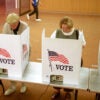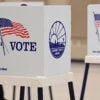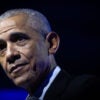Conservative lawmakers have no regrets about not voting for the farm bill, after House leadership refused to have an immediate vote on an immigration bill.
“There has to be an intensity and a focus directed on a problem and on a question in order to get it figured out, that is what we tried to accomplish last week,” Rep. Jim Jordan, R-Ohio, said of the House Freedom Caucus sinking the vote on the farm bill May 18.
“I actually like the work requirements in the farm bill but my point was I ain’t gonna vote on a farm bill until we figure out what we are going to [do] on immigration, plain and simple,” Jordan said at Conversations with Conservatives, a monthly event with press to discuss the most important issues of the day.
The Daily Signal depends on the support of readers like you. Donate now
“We have plenty of time to pass the farm bill for goodness’ sake,” added Jordan, a member of the House Freedom Caucus.
“We are trying to get a focus and an intensity on dealing with immigration in a way that is consistent with the mandate of the 2016 election,” Jordan said. “That has to happen, and yes, leadership should work with us to get that done, and that is all we are trying to do because this is an issue that was central to the campaign in 2016 that we were elected by the American people to deal with in the right way.”
Centrist Republicans in the U.S. House, including Rep. Carlos Curbelo, R-Fla., joined at least 19 other Republicans and a majority of Democrats to sign onto a plan that could give amnesty to those brought here illegally as minors under President Barack Obama’s Deferred Action for Childhood Arrivals, or DACA, program.
If all 193 Democrats join 25 Republicans in signing a discharge petition, they would reach the required 218 signatures and trigger a floor vote that could happen as soon as June 25.
Leadership announced Monday that lawmakers will vote in June on an immigration bill from Rep. Bob Goodlatte, R-Va., chairman of the House Judiciary Committee, in exchange for a vote on the farm bill on June 22.
The Senate has already voted on and failed to pass four different immigration bills, one of which was a bill sponsored by seven senators, including Sen. Chuck Grassley, R-Iowa, chairman of the Judiciary Committee, and backed by the White House. It would have allocated $25 billion for border security measures, such as radar, physical and virtual fencing, and other technologies, including a border wall.
The Goodlatte bill would require employers to use E-Verify, now a voluntary system, to check the immigration status of workers and would authorize a wall at the U.S.-Mexico border and other efforts designed to increase border security.
Rep. Andy Biggs, R-Ariz., said he is “not a big fan of the Goodlatte bill,” but says he knows a vote triggered by the discharge petition would give amnesty to the roughly 800,000 recipients of DACA, whom some call “Dreamers.”
“The discharge petition is a mistake and I think it is going to cause red states … previously red districts are going to struggle if that happens,” said Biggs. “I think the outcome of that would be a miserable … you are going to see amnesty and that will be an enormous, enormous problem.”
Rep. Warren Davidson, R-Ohio, said lawmakers shouldn’t be voting on legislation that the president wouldn’t even sign.
“I think it is important to have a process where we can produce a bill the president can sign,” Davidson said, adding:
Everyone recognizes that the president isn’t going to sign a product of the discharge petition, a clean DREAMer Act. I think that rather [than] voting on things that can’t pass, that can’t get the president’s signature, we should continue our collaboration here and the process that we’ve been engaging on hasn’t produced that result.
The DACA population has been clarified in this article.






























